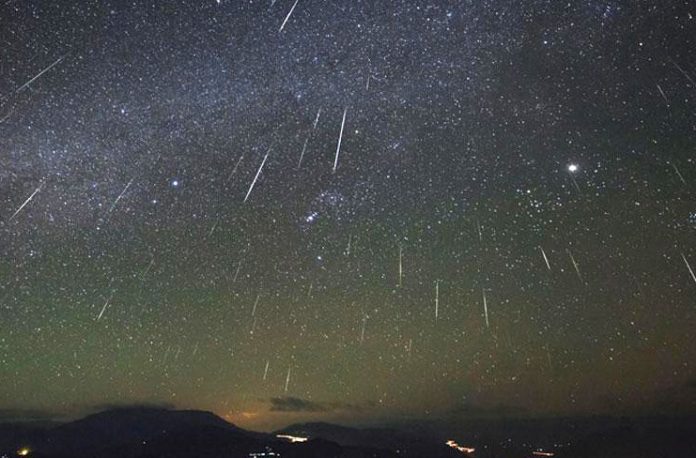Orionids meteor shower peaking: what time will the meteor shower peak?.
The annual Orionid meteors are active between October and November when the Earth crosses the dusty orbital trail of Comet 1P/Halley.
The Orionids are the second meteor shower of the month after the Draconids and are the more active one.
The shower peaks every year around the same time towards the end of October and this year the peak falls on October 21 and October 22.
During the Orionids’ peak, the shower is expected to produce between 20 and 25 fast meteors every hour.
The Orionids are best seen between midnight and the pre-dawn hours when the skies are at their darkest.
But depending on where you live, you might be able to spot one or two Orionid shooting stars a few hours before midnight.
The meteors will appear to radiate tonight from a point in the sky just to the left of the constellation Orion.
As the night progresses, the Orionid radiant will appear at different locations at different times.
When observed from London, UK, the Orionids’ radiant will sit at an altitude of 0.5-degrees at 10pm BST.
By 11pm BST the radiant will sit further up in the sky to 8.9-degrees in altitude.
At midnight, the radiant will feature fairly high up at 18.1-degrees.
The meteors’ radiant will climb over the next few hours, peaking by 5am BST at an altitude of 53.9-degrees.
After 5am BST, the radiant will start to descend and will reach about 42.4-degrees in altitude by 8am BST on Monday.
In addition, the skies will start to darken tonight around 6pm BST when the Sun dips below the horizon.
On Monday, the skies will then brighten again around 7.36am BST – the time of sunrise.
Other factors to watch out for tonight is the brightly lit Waxing Gibbous Moon, which might wash out the skies somewhat.
The Moon will rise today after 5.12pm BST and set tomorrow morning after 4.43am BST.
How to see the Orionid meteors tonight?
The Orionids are incredibly fast and hard to track, so it is safe to leave you telescopes and binocular at home.
If you plan to venture outside tonight to see the shower, stay on the lookout for a dark, wide-open spot with an unobstructed view of the horizon.
At the same time, you should stay clear of building, lamps and car – the less light the better.
After that, wrap yourself in some warm blankets, grab some snacks and drinks and lie back so that you can see the entire sky at once.
The Orionids will dash across the sky incredibly fast, leaving bright trails of light and might occasionally erupt into even more spectacular fireballs.















